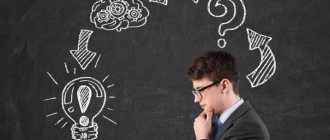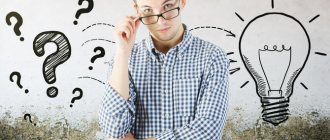How to develop logical thinking? Millions of people ask this question in order to avoid mistakes, solve school and work tasks faster, apply it in life, be the best in their field, achieve their goals and simply develop. To do this, you need to figure out what it is, what types there are and how to train it.
What is logical thinking?
To explain what “logical thinking” is, let’s divide this concept into two parts: thinking and logic. Now let's define each of these components.
Human thinking is a mental process of processing information and establishing connections between objects, their properties or phenomena of the surrounding world. Thinking allows a person to find connections between the phenomena of reality, but in order for the connections found to truly reflect the true state of affairs, thinking must be objective, correct or, in other words, logical, that is, subject to the laws of logic.
Logic translated from Greek has several meanings: “the science of correct thinking”, “the art of reasoning”, “speech”, “reasoning” and even “thought”. In our case, we will proceed from the most popular definition of logic as a normative science about the forms, methods and laws of human intellectual mental activity. Logic studies ways to achieve truth in the process of cognition in an indirect way, not from sensory experience, but from knowledge acquired earlier, therefore it can also be defined as the science of ways to obtain inferential knowledge. One of the main tasks of logic is to determine how to come to a conclusion from existing premises and gain true knowledge about the subject of thought in order to gain a deeper understanding of the nuances of the subject of thought being studied and its relationships with other aspects of the phenomenon under consideration.
Now we can define logical thinking itself.
Logical thinking is a thought process in which a person uses logical concepts and constructions, which is characterized by evidence, prudence, and the goal of which is to obtain a reasonable conclusion from existing premises.
There are also several types of logical thinking; we list them, starting with the simplest:
1
Figurative-logical thinking
Figurative-logical thinking (visual-figurative thinking) - various thought processes of the so-called “figurative” problem solving, which involves a visual representation of the situation and operating with images of its constituent objects. Visual-figurative thinking, in fact, is synonymous with the word “imagination”, which allows us to most vividly and clearly recreate the whole variety of different actual characteristics of an object or phenomenon. This type of human mental activity is formed in childhood, starting from approximately 1.5 years.
To understand how developed this type of thinking is in you, we suggest you take the IQ Test “Raven’s Progressive Matrices”
The Raven's Test is a progressive matrix scale for assessing IQ, mental ability, and logical thinking, developed in 1936 by John Raven and Roger Penrose. This test can give the most objective assessment of the IQ of the people being tested, regardless of their level of education, social class, type of activity, linguistic and cultural characteristics. That is, it can be said with a high probability that the data obtained as a result of this test from two people from different parts of the world will evaluate their IQ equally. The objectivity of the assessment is ensured by the fact that this test is based solely on images of figures, and since Raven's matrices are among non-verbal intelligence tests, its tasks do not contain text.
The test consists of 60 tables. You will be offered drawings with figures connected to each other by a certain relationship. One figure is missing; it is given at the bottom of the picture among 6-8 other figures. Your task is to establish a pattern that connects the figures in the picture and indicate the number of the correct figure by choosing from the proposed options. Each series of tables contains tasks of increasing difficulty, at the same time, the complication of the type of tasks is observed from series to series.
Statistics Full screen
2
Abstract logical thinking
Abstract-logical thinking is the performance of a thought process using categories that do not exist in nature (abstractions). Abstract thinking helps a person model relationships not only between real objects, but also between abstract and figurative ideas that thinking itself has created. Abstract logical thinking has several forms: concept, judgment and inference, which you can learn more about in the lessons of our training.
3
Verbal and logical thinking
Verbal-logical thinking (verbal-logical thinking) is one of the types of logical thinking, characterized by the use of linguistic means and speech structures.
This type of thinking requires not only the skillful use of thought processes, but also competent command of one’s speech. We need verbal-logical thinking for public speaking, writing texts, arguing, and in other situations where we have to express our thoughts using language.
Logical thought processes
We are all individuals and have unique experiences, however, similar processes occur in our brains that lead to information processing and inference.
Here are the main operations taking place in our head:
- Analysis. During this operation, our brain decomposes a phenomenon into several components in order to consider each of them separately, to identify its influence, relationship and impact. Any object or event has main elements into which the brain automatically breaks it down to process information.
- The opposite process to analysis is synthesis. This mental operation involves putting together small details and parts into a whole to assess the situation. A striking example of synthesis is putting together a puzzle.
- Comparison. This process requires finding the differences and similarities of an object/event relative to something. It can be superficial, incomplete, or deep, complete. Comparison is based on analysis, because in order to compare two objects, you need to mentally break them down into their components.
- Generalization. A process that combines objects or events into a single whole based on similar characteristics. We often use it to summarize.
- Specification. The exact opposite of the previous thought process. Its essence lies in the accuracy and determination of individual characteristics of an object/event, revealing its internal content.
- Abstraction helps a person to focus on a specific object or its feature, discarding extraneous ones. This is an isolated study of the characteristics of an object/event for deeper knowledge.
- Classification involves the use of a system for dividing objects according to certain criteria, is based on analysis and helps to organize objects/events for oneself.
Some mental operations are mutually exclusive, so you need to use certain types in appropriate situations. The choice of thought process depends on the goal that a person wants to achieve after processing information, which is why it is necessary to develop logical thinking.
Applying logic
Thinking using the tools of logic is necessary in almost any area of human activity, including the exact sciences and humanities, economics and business, rhetoric and public speaking, the creative process and invention. In some cases, strict and formalized logic is used, for example, in mathematics, philosophy, and technology. In other cases, logic only provides a person with useful techniques for obtaining a reasonable conclusion, for example, in economics, history, or simply in ordinary “life” situations.
As already mentioned, we often try to think logically on an intuitive level. Some people do it well, some do it worse. But when connecting the logical apparatus, it is better to know exactly what mental techniques we use, since in this case we can:
- It’s more precise to choose the right method that will allow you to come to the right conclusion.
- Think faster and better - as a consequence of the previous point.
- It's better to express your thoughts.
- Avoid self-deception and logical fallacies.
- Identify and eliminate errors in other people’s conclusions, cope with sophistry and demagoguery.
- Use the necessary argumentation to convince your interlocutors.
Useful tips
To develop logic, it is not enough to pay attention to problems, solve puzzles, crosswords, and read specialized literature. There are some more tips:
- Left-handers should learn to write with their right hand and vice versa. This will improve the functioning of the less developed part of the brain.
- Change the type of activity from time to time. For example, do one thing for an hour or two, and then change jobs.
- Read detective stories, trying to predict what the main character and other characters will do in a given case. This process promotes the development of deduction.
- Explain your actions and actions. A thorough analysis of daily incidents makes it possible to build logical chains and draw conclusions regarding how best to proceed next time.
It is also worth being outside more often. Walking improves brain function in general.
Components of logical thinking
The use of logical thinking is often associated with quickly solving logic tasks and passing tests to determine the level of intellectual development (IQ). But this direction is associated to a greater extent with bringing mental operations to automatism, which is a very insignificant part of how logic can be useful to a person.
The ability to think logically combines many skills in the use of various mental actions and includes:
- Knowledge of the theoretical foundations of logic.
- The ability to correctly perform such mental operations as: classification, specification, generalization, comparison, analogy and others.
- Confident use of key forms of thinking: concept, judgment, inference.
- The ability to argue your thoughts in accordance with the laws of logic.
- The ability to quickly and effectively solve complex logical problems (both educational and applied).
Of course, such operations of thinking using logic as definition, classification and categorization, proof, refutation, inference, conclusion and many others are used by every person in his mental activity. But we use them unconsciously and often with errors, without a clear idea of the depth and complexity of those mental actions that make up even the most elementary act of thinking. And if you want your logical thinking to be truly correct and rigorous, you need to learn this specifically and purposefully.
Ten-minute exercises for developing logic for every day
A couple of random words
Select two words at random from an article or story - just point your finger at the words without thinking about their meaning. Now you need to try to find something in common between the selected words - compare them, find the relationship. Come up with an interesting story that could connect the two concepts.
Associations
Look around the room you are in now. Choose an object in the room - for example, a chair or a plate. Take a piece of paper and come up with five adjectives that best describe the thing you have chosen. Example: round plate, yellow plate, small plate, clean plate, empty plate.
Now write five adjectives that are completely inappropriate for the chosen subject. Example: wooden plate, boiled plate, winter plate, windy plate, silk plate. Undoubtedly, such exercises will benefit you if you do them daily. Plus, you don’t have to spend a lot of time on them! Try to start today, and you will soon notice significant progress in the development of logical thinking and imagination.
How to learn this?
Logical thinking is not given to us from birth, it can only be learned. There are two main aspects of teaching logic: theoretical and practical.
Theoretical logic
, which is taught at universities, introduces students to the basic categories, laws and rules of logic.
Practical training
aimed at applying the acquired knowledge in life. However, in reality, modern teaching of practical logic is usually associated with passing various tests and solving problems to test the level of intelligence development (IQ) and for some reason does not address the application of logic in real life situations.
To truly master logic, you need to combine theoretical and applied aspects. Lessons and exercises should be aimed at developing intuitive, automated logical tools and consolidating the acquired knowledge in order to apply it in real situations.
Based on this principle, the online training that you are reading now was compiled. The purpose of this course is to teach you to think logically and apply logical thinking techniques. Classes are aimed at introducing the basics of logical thinking (thesaurus, theories, methods, models), mental operations and forms of thinking, rules of argumentation and laws of logic. In addition, each lesson contains tasks and exercises to train you to use the acquired knowledge in practice.
How to develop ingenuity and intelligence
Many factors influence intelligence and ingenuity. If you are forced to subject your body to constant stress, then it is not surprising that your reactions will leave much to be desired. During peak periods, the human body produces cortisol, which has a detrimental effect on brain cells. If you have to take on a ton of things in the morning, then you should try to slow down your usual pace of life at least a little. Start by not jumping out of bed immediately after the alarm clock rings - allow yourself some time (15-25 minutes) to lie down and think about the coming day.
Ways to improve your intelligence
Music.
Periodically take a break from the daily hustle and bustle by listening to music. By the way, scientists believe that classical works are very useful for activating the brain. For example, people who listen to Mozart from time to time are characterized by increased speed of thinking.
Don't waste energy.
Don't take on many tasks at once. To do something well, it is important to focus on it. If you have to answer a letter, talk on the phone and listen to the news at the same time, then, of course, attention will begin to dissipate among several sources of information. The result will be a decrease in concentration and even the level of intelligence.
More positive.
Do not deny yourself positive emotions - your performance directly depends on them. Visit parks more often, go to the movies, meet friends.
Development.
Regularly search the Internet for exercises to develop memory and enrich your vocabulary. It is unlikely that you will be “illuminated” by unexpected solutions if you have a poor vocabulary that is almost unable to hold anything in your head. To develop memory, learn poetry, just read books.
Logic lessons
Having collected a wide range of theoretical materials, as well as having studied and adapted the experience of teaching applied forms of logical thinking, we have prepared a series of lessons for the full mastery of this skill.
Lesson 1. Logical analysis of language
We will devote the first lesson of our course to a complex but very important topic - the logical analysis of language. It’s worth mentioning right away that this topic may seem abstract to many, loaded with terminology, and inapplicable in practice. Don't be scared! Logical analysis of language is the basis of any logical system and correct reasoning. The terms that we learn here will become our logical alphabet, without knowledge of which we simply cannot go further, but gradually we will learn to use it with ease.
Lesson 2. Concept in logic
A logical concept is a form of thinking that reflects objects and phenomena in their essential features. Concepts come in different types: concrete and abstract, individual and general, collective and non-collective, irrespective and correlative, positive and negative, and others. Within the framework of logical thinking, it is important to be able to distinguish these types of concepts, as well as produce new concepts and definitions, find relationships between concepts and perform special actions on them: generalization, limitation and division. You will learn all this in this lesson.
Lesson 3. Definition in logic
In the first two lessons, we talked about how the task of logic is to help us move from an intuitive use of language, accompanied by errors and disagreements, to a more orderly use of it, devoid of ambiguity. The ability to handle concepts correctly is one of the skills required for this. Another equally important skill is the ability to correctly define. In this lesson we will tell you how to learn this and how to avoid the most common mistakes.
Lesson 4. Logical reasoning
Logical judgment is a form of thinking in which something is affirmed or denied about the surrounding world, objects, phenomena, as well as relationships and connections between them. Judgments in logic consist of a subject (what the judgment is about), a predicate (what is said about the subject), a copula (what connects the subject and the predicate) and a quantifier (the scope of the subject). Judgments can be of various types: simple and complex, categorical, general, particular, individual. The forms of connectives between the subject and the predicate also differ: equivalence, intersection, subordination and compatibility. In addition, within the framework of composite (complex) judgments there can be their own connectives, which define six more types of complex judgments. The ability to think logically presupposes the ability to correctly construct various types of judgments, understand their structural elements, features, relationships between judgments, and also check whether a judgment is true or false.
Lesson 5. Laws of logic
Before moving on to the last third form of thinking (inference), it is important to understand what logical laws exist, or, in other words, objectively existing rules for constructing logical thinking. Their purpose, on the one hand, is to help build inferences and argumentation, and on the other hand, to prevent errors and violations of logic associated with reasoning. This lesson will examine the following laws of formal logic: the law of identity, the law of excluded middle, the law of contradiction, the law of sufficient reason, as well as De Morgan's laws, the laws of deductive inference, Clavius' law and the laws of division. By studying examples and completing special exercises, you will learn how to purposefully use each of these laws.
Lesson 6. Inference
Inference is the third form of thinking in which from one, two or more propositions, called premises, a new proposition, called a conclusion or conclusion, follows. Inferences are divided into three types: deductive, inductive and analogical inferences. In deductive inference (deduction), a conclusion is drawn from a general rule for a particular case. Induction is inference in which a general rule is derived from several particular cases. In inferences by analogy, based on the similarity of objects in some characteristics, a conclusion is drawn about their similarity in other characteristics. In this lesson you will become familiar with all types and subtypes of inferences and learn how to build various cause-and-effect relationships.
Lesson 7. Syllogisms
This lesson will focus on multi-premise inferences. Just as in the case of single-premise conclusions, all the necessary information in a hidden form will already be present in the premises. However, since there will now be many premises, the methods for extracting them become more complex, and therefore the information obtained in conclusion will not seem trivial. In addition, it should be noted that there are many different types of multi-premise inferences. We will focus only on syllogisms. They differ in that both in the premises and in the conclusion they have categorical attributive statements and, based on the presence or absence of some properties in objects, they allow one to draw a conclusion about the presence or absence of other properties in them.
Lesson 8. Types of reasoning
In previous lessons we talked about various logical operations that form an important part of any reasoning. Among them were operations on concepts, definitions, judgments and inferences. This means that at this point it should be clear what components the reasoning consists of. However, we have not yet touched upon the questions of how reasoning as a whole can be organized and what types of reasoning there are in principle. This will be the topic of the last lesson. Let's start with the fact that reasoning is divided into deductive and plausible. All types of inferences discussed in previous lessons: inferences using a logical square, appeals, syllogisms, enthymemes, sorites, are precisely deductive reasoning. Their distinctive feature is that the premises and conclusions in them are connected by a relation of strict logical consequence, while in the case of plausible reasoning there is no such connection. First, let's talk more about deductive reasoning.
Measure the immeasurable - solve Fermi problems
The great mathematician Enrico Fermi (the same one who is famous for the paradox) believed that in 60 seconds you can evaluate absolutely everything. You only need to know a few facts to roughly calculate how many selfies are taken per day on Earth, how many times on average people use obscene language, or answer another similar question.
I'll explain with an example. Let’s say you were asked: “How many women earn extra money doing manicures in St. Petersburg?” To give an approximate answer, you can use the following logic:
- I remember that Moscow has a population of about 12 million. St. Petersburg is about 2 times smaller - let it be 6 million;
- Half of the girls I know get their nails done by a specialist; about 50% of the population are women. This means that in St. Petersburg there are potentially 1.5 million women “getting their nails done” at a salon;
- People go for a manicure about once every 2 weeks - about 26 times a year. This means that in a year in St. Petersburg it will be 1.5 million * 26 times = 39 million times;
- A manicure takes about an hour, which means one master can serve 8 clients per day;
- Now we need to find out how many masters are required to have time to do manicures 39 million times a year, with a “productivity” of 8 clients per day per specialist. 39 million / 365 days / 8 times a day = 13,356 manicurists in St. Petersburg.
Of course, this is an approximate figure. After all, masters do not work every day, and the calculation does not take into account men who do manicures, children, as well as male masters. Surely something else is missing or mixed up. But in solving such problems, the approach itself is important. By the way, large companies like to ask such questions during interviews in order to see how a person thinks, whether he thinks at all or immediately gives up and says that it is impossible to solve the problem.
Therefore, I suggest you start training. Let's think logically, how many people have given up their dreams in favor of laziness?
How to take classes?
The lessons themselves with all the exercises can be completed in 1-3 weeks, having mastered the theoretical material and practiced a little. But to develop logical thinking, it is important to study systematically, read a lot and constantly train.
For maximum effect, we recommend that you first simply read all the material, spending 1-2 evenings on it. Then take 1 lesson daily, doing the necessary exercises and following the suggested recommendations. After you have mastered all the lessons, engage in effective repetition using this technique to remember the material for a long time. Next, try to apply logical thinking techniques more often in life, when writing articles, letters, when communicating, in disputes, in business, and even in your leisure time. Reinforce your knowledge by reading books and textbooks, as well as using additional material, which will be discussed below.
How to develop memory and thinking in adults
Tasks for the development of logical thinking
On the Internet you can easily find a variety of tasks with the help of which you will be able to develop logical thinking. Many sites will offer you different levels of tasks. Try to start with something not too difficult and gradually move on.
Learn to think logically through games, puzzles and strategies
Also, a variety of games, strategies and puzzles can greatly contribute to the development of logical thinking. To do this, it is not necessary to search for tasks on the Internet. Even by purchasing a box of puzzles, you can not only have an entertaining evening, but also significantly improve your level of logical thinking.
10 ways to develop your memory
1.) Read a lot of books
Of course, a person who is inclined to read has a better memory than one who does not show any interest in this activity. So how can this be used. Read a short story, then immediately retell it into the recorder. After a few hours, try repeating this retelling. Analyze what details you forgot, what you missed. Do these exercises regularly.
2.) Pronounce words backwards
This is also a very useful method to improve your memory. It is also impossible not to note the convenience of this method - you do not need a voice recorder or other auxiliary devices. Perform this task before going to bed, on the road, in line, and so on. If possible, you can do the exercise on a piece of paper, in a notepad - this way it will be more convenient for you to test yourself.
3.) Study poetry and new words
Memorizing poetry is a wonderful memory trainer. You can also learn new words that are unfamiliar to you. As soon as such a word catches your eye, at any opportunity, look up its meaning in the dictionary. After this, try “in your head” to compose several sentences in which the new word will be used.
4.) Remember everything in detail, analyze
Get into the habit of replaying in your memory every evening the events that happened to you over the past day. Start from the moment you wake up. Remember what you thought about when you woke up, what you ate for breakfast, who you talked to. Next, move on to memories of how your day went, what people you interacted with, what tasks you faced. Then move on to memories of the evening. Analyze what unpleasant events you could have avoided, what useful things you learned today, what action was senseless, and so on.
5.) Draw images in your head
Quite an interesting exercise that perfectly develops the imagination. For example, imagine yourself on vacation. Let's say, not just you sitting on the shore, but in more detail. Imagine that you are sitting on the warm sand, you have a glass of lemonade or beer in your hand, and there is a plate of shrimp or corn next to you - you can hear their smells. You also hear the sound of sea waves, and sometimes their splashes reach you. You can add any more details.
So, imagine whatever you want. For example, you find yourself in a summer garden: the shadow of the trees falls on you, you hear the smell of raspberries, and pear fruits periodically fall to the ground. The sun's rays break through the foliage.
6.) Get a good night's sleep
Undoubtedly, you have already heard that adequate sleep has an important effect on our memory. If you sleep at least seven hours a night, you can be sure that this has the best effect not only on memory, but also on concentration and even on the rejuvenation of body cells. Good sleep is essential for energy and overall health.
7.) Aivazovsky’s method develops photographic memory
This training technique got its name in honor of the famous artist. While writing his works and paintings, Ivan Konstantinovich mentally tried to stop the movement of the wave and transfer it to his painting so that it would not look frozen.
Aivazovsky devoted many hours to the process of observing water. At the same time, he closed his eyes from time to time, trying to reproduce what he saw in his memory.
How to use this technique?
- Study an object or landscape for 5 minutes.
- Covering your eyelids, try to reproduce the image of this picture in your memory. It is also important that it be colored.
- The effectiveness of training can be increased by fixing objects on a piece of paper.
- If you perform this exercise regularly, you will be able to achieve considerable progress in the development of visual memory.
8.) Schulte tables
Such tables are used to determine the degree of attention, which in turn is directly related to memory - you can find them in abundance on the Internet. To do this, just search for “Schulte tables online” and start training.
Note that we are talking about a field divided into squares, and in those, in turn, numbers from 1 to 25 are written in random order. Subsequently, you will need to find all the numbers in order using a stopwatch - the search speed should increase over time.
9.) Fortified healthy foods
Of course, for good memory it is important to eat food that is as rich in vitamins as possible. Which products should you pay the most attention to? Eat apples, salmon, blueberries, spinach, various seeds and nuts, and grapes.
10.) Develop your left hand if you are right-handed and vice versa
A very useful activity. Set yourself challenging goals. Train your left hand if you are left-handed, and your right hand if you are right-handed. Using your “unaccustomed” hand will be difficult at first, but over time you will master this skill.
Books and textbooks on logic
On this page we have selected useful books and textbooks that will help you deepen your knowledge of logic and logical thinking:
- "Applied Logic".
Nikolai Nikolaevich Nepeyvoda; - "Textbook of Logic".
Georgy Ivanovich Chelpanov; - "Logic: lecture notes."
Dmitry Shadrin; - "Logics.
Training course" (educational and methodological complex). Dmitry Alekseevich Gusev; - “Logic for Lawyers” (collection of problems).
HELL. Getmanova; - "Logics.
Textbook for law schools." IN AND. Kirillov, A.A.Starchenko - "Logics.
Textbook for high school." Vinogradov S.N., Kuzmin A.F. - "Logics.
Textbook for humanities faculties." A.A.Ivin - "Logics".
Ivanov E.A. - And others.
TOP 10 exercises that develop a child’s thinking
- Find as many objects as possible that are similar to the invented word. For example, you can choose those that have the same shape. To the “ground” we select “ball”, “apple”, “balloon”.
- List the objects that share some property. We need to name it. Examples: cup, saucer, pan - dishes; apple, apricot, pear - fruits; hat, shirt, shorts – clothes.
- From the list of words it is necessary to exclude the one that does not fit all the others. Apple, soup, pencil, bread. (Bread)
- Come up with a coherent sentence with arbitrary three words. For example, sun, pineapple, shopping. Today we have an unusual purchase - a pineapple that looks like the sun. We see that words do not change by case. This is the best answer. If it becomes difficult, you can incline the words or reduce their number.
- We have a series of words, all of which except one begin or end with the same letter. You need to find this word.
- Come up with as many objects as possible of the same color or the same shape. A modified task will be the selection of objects that have a similar taste, smell, etc.
- Guess the hidden word based on its signs. Cold, fluffy, winter. (Snow)
- Take an excerpt from any story. Come up with a beginning and a logical conclusion to it in detail.
- A few simple phrases: “cold wind”, “delicious dinner”, “business coat”, “huge interest”, read first in the correct order, and then in the reverse order.
- Find as many differences as possible between an airplane and a ship, an apple and a potato, etc.
When working with your child, remember that the formation of thinking begins at an early age. Make it a habit to regularly ask your child some of the above problems. Very soon you will be able to notice that some exercises delight your baby. Present it all in a playful way. For the child it will be both exciting and useful at the same time.
Trainings
Training and development of logical thinking can be supplemented by the following trainings, which you can take for free on our website:
1. Memory and attention are important abilities for logical thinking, which will allow you to concentrate on a large number of mental objects on which logical operations are carried out.
2. Creative thinking together with logic will give you the opportunity not only to draw correct conclusions, but to look for non-standard solutions where logic has reached a dead end.
3. Oratory and writing skills form verbal and logical thinking, and also allow you to apply the acquired knowledge in practice in this course.
4. Mental arithmetic and speed reading are suitable for developing and training intellectual abilities.
5. Human psychology is useful in understanding logical thinking, because it is psychology as a science that studies mental operations, motives, and incentives of a person.
How to develop logic and thinking in a teenager
Tasks, puzzles and charades
On the Internet you can find many puzzles that you and your teenager can try to solve. Try to look for tasks that contain the correct answer - if the goal is not achieved, you can see how it could have been achieved.
A special application with tasks for a smartphone
On Google Play you can easily find an application called “Logic, Problems, Puzzles” - it can be installed on your smartphone. The essence of the application is to develop analytical skills in adults and adolescents. There are also apps like Brain Training, Lumosity and many others.
Ability to analyze: different tasks - one goal
Ability to analyze information reflects the ability to analyze data, examine it, compare it, and draw conclusions. To identify the level of development of analytical abilities, assessment tests are used, the results of which do not depend on subjective factors.
Testing consists of the following tasks:
- verbal;
- numeric;
- brain teaser;
- understanding the basics of mechanics.
The candidate is required to perform analysis of numerical, verbal or abstract information. The test result reflects his ability to work with numbers, texts, images, and perform mathematical and logical operations
. Verbal, numerical, and logical tasks determine the level of proficiency in logic or mathematics, and each correct answer increases the value of the test taker in the eyes of the employer.
The analytical thinking test is used to select the strongest candidates for employment. Recruiters use cases and conduct interviews, but ability testing gives the most objective result, eliminating bias towards the applicant.
When to start training
One may come across the opinion that the development of logic is important only for schoolchildren and students, before it is of no use. Logic is needed at any age.
In fact, her training begins in infancy. The baby takes the rattle, shakes it and establishes a chain of cause and effect: to get a sound, you need to shake the object. An older child throws a pacifier and watches it fall. Again, logical thinking is at work here: the pacifier will fall down if dropped, and will not hang in the air.
Baby with a rattle
Attention! Parents must realize that everything is fine on time. A two-month-old child should not be forced to sort objects, match pairs, etc. Any activity should be age appropriate. Thus, a sorter (a box with slots in the form of different geometric shapes and shapes that need to be correctly inserted into these slots) and a pyramid, which mothers love to give to very young children, on average are mastered by them at the age of about a year. Previously, demanding that the baby fulfill the conditions of the game is useless and even harmful.










